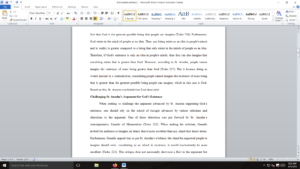Empirical premise
Instructions. Read Carefully! Please answer three of the following questions in approximately two typed, double-spaced pages each. You may consult your notes and any assigned readings you think might be helpful. If you wish—though I don’t consider it necessary—you may also consult library materials. However, under no circumstances should you consult any Internet materials. In avoiding even the appearance of plagiarism, err on the side of caution. Be sure to credit every source you use, and to provide specific page references for every quotation or paraphrase. Extended quotations are discouraged. You may visit us in the office at any time during the examination period, though don’t be surprised if we try, in a Socratic vein, to get you to reach your own answers to the questions, rather than laying out ours. You may also discuss the exam with your classmates, prior to writing it. Once you have started the actual writing, classmates and other fellow students are off limits.You may not share your completed exam, in whole or in part, with anyone who has yet to submit his or her own exam.
Your answers will be evaluated primarily on the clarity of your reasoning. Each answer is worth 5 points.
Exams must be turned in on Canvas. You are only allowed one submission, so include all three of your essays in a single file! To ensure compatibility, you are required to use Microsoft Word format. You may turn in your exam early, but because this is a timed exercise, no late papers will be accepted. You are responsible for retaining a backup, either on paper or disk. No hardcopy or email submissions will be accepted under any circumstances.
- According to Charles Darwin in Descent of Man, how many races of humanity are there, and why?
- What is St. Anselm’s argument for the existence of God, and how might one challenge it?
- Explain the “optimism” to which Voltaire refers in the subtitle of Candide, and describe Voltaire’s assessment of it.
- What is the challenge posed by Glaucon and Adeimantus in Republic II, and how does Socrates propose to address it?
- Explain the myth of Gyges as it occurs in Republic II, and its significance in the context of the dialogue.
- What is Cartesian skepticism, and how might we refute it?
- Explain foundationalism.
Answer preview
Cartesian skepticism is a type of methodological doubt advanced by Rene Descartes. In much simpler terms, Cartesian skepticism denotes a systematic approach to doubting the truthfulness of the beliefs held by a person (Pereira 245). Many people within the philosophy disciple perceive the methodology advanced by Descartes as the foundation of the contemporary empirical approach (Pereira 245). When coming up with the methodology, Descartes doubted the truthfulness of all the beliefs he held. By doing this, Descartes was seeking to establish which of his beliefs were actually true. This approach laid the foundation for the statement he made “I doubt therefore I think, I think therefore I exist” (Pereira 245). Under his methodology of Cartesian skepticism, Descartes argued that people should only accept information they know is true, break down these truths into smaller factions, begin by solving simple challenges,
[2012 Words]

Empirical premise

